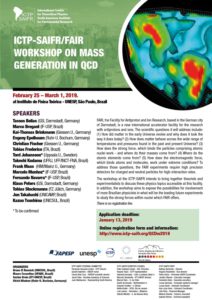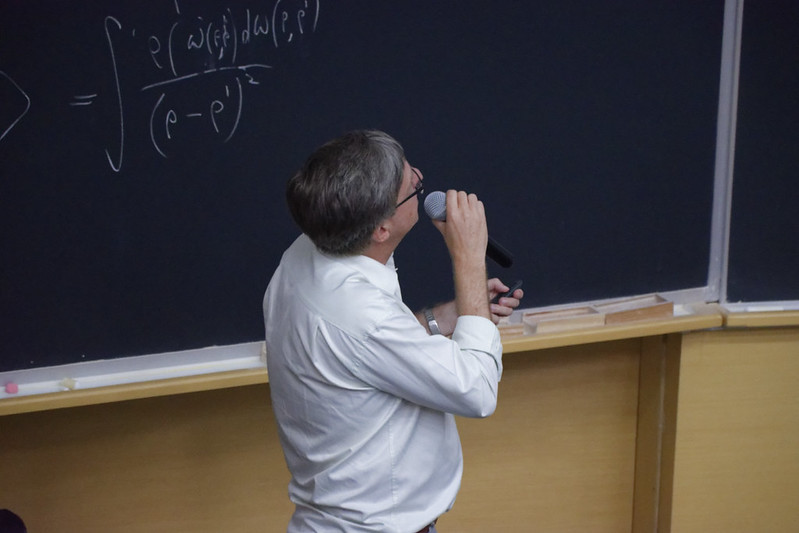ICTP-SAIFR/FAIR Workshop on Mass Generation in QCD

February 25 – March 1, 2019
ICTP-SAIFR, São Paulo, Brazil
Auditorium of IFT-UNESP
Home
FAIR, the Facility for Antiproton and Ion Research, based in the German city of Darmstadt, is a new international accelerator facility for the research with antiprotons and ions. The scientific questions it will address include:
(1) How did matter in the early Universe evolve and why does it look the way it does today?
(2) How does matter behave across the wide range of temperatures and pressures found in the past and present Universe?
(3) How does the strong force, which binds the particles comprising atomic nuclei work – and where do their masses come from?
(4) Where do the atomic elements come from?
(5) How does the electromagnetic force, which binds atoms and molecules, work under extreme conditions?
To address those questions, the FAIR experiments require high precision detectors for charged and neutral particles for high-interaction rates.
The workshop at the ICTP-SAIFR intends to bring together theorists and experimentalists to discuss these physics topics accessible at this facility. In addition, the workshop aims to expose the possibilities for involvement of more Brazilian physicists in what will be the leading future experiments to study the strong forces within nuclei which FAIR offers. There is no registration fee.
Confirmed Speakers
- Anna Bakhausen (DAAD São Paulo, Brazil): Funding opportunities from the DAAD
- Fábio Braghin (Universidade Federal de Goiás, Brazil): Pion and constituent quark effective interactions and constituent quark mass
- Fábio Köpp Nobrega (Universidade Federal do Rio Grande do Sul): Heavy quark hadroproduction within dipole framework at FAIR
- Tassos Belias (GSI, Darmstadt, Germany): The PANDA detector
- Marco Bregant (IF-USP, Brazil): Instrumentation Lab of HEPIC@IFUSP
- Kai-Thomas Brinkmann (Giessen University, Germany): Photon spectroscopy at PANDA and elsewhere
- Chen Chen (IFT-UNESP, Brazil): Structure of the nucleon’s low-lying excitations
- Mauro Cosentino (UFABC, Brazil): Simulation for high energy physics detectors
- Evgeny Epelbaum (Ruhr-University Bochum, Germany): Hadronic molecules from effective field theory
- Christian Fischer (Giessen University, Germany): QCD phase transition from Dyson- Schwinger equations
- Tobias Frederico (Instituto Tecnológico da Aeronáutica, Brazil): Minkowski space dynamics for hadrons
- Tord Johansson (Uppsala University, Sweden): Prospects for hyperon physics with PANDA
- Takeshi Kodama (UFRJ, UFF/INCT-FNA, Brazil): The National Institute for Nuclear Physics and Applications
- Rubens Lichtenthäler (USP, Brazil): Selected ongoing projects at RIBRAS
- Frank Maas (HIM/Mainz University, Germany): Nucleon structure studies with the PANDA experiment
- João Pacheco Melo (UNICSUL, Brazil): Extraction of the Electromagnetic Form Factors for Spin-1 Particles on the Light-Front
- Marcelo Munhoz (IF-USP, Brazil): Heavy-Flavor Hadrons as a Probe of the Quark-Gluon Plasma
- Fernando Navarra (IF-USP, Brazil): Heavy quarkonium in a hadron gas
- Marina Nielsen (USP, Brazil): Recent developments on the X, Y and Z states
- Jorge Noronha (USP, Brazil): Out-of-equilibrium phenomena at finite density
- Klaus Peters (GSI, Darmstadt, Germany): Status and progress of FAIR / Experimental status and outlook of the XYZ mystery
- Gilberto Ramalho (UNICSUL, Brazil): Octet baryon double ratios GE/GM in a nuclear medium
- Fernando Serna (UNICSUL, Brazil): Interplay of dynamical and explicit chiral symmetry breaking effects on a quark
- Tobias Stockmanns (FZ Jülich, Germany): PandaRoot — the simulation and reconstruction framework of PANDA
- Alinka Lépine Szily (USP, Brazil): RIBRAS — Radiactive Beams in Brazil
- Giorgio Torrieri (UNICAMP, Brazil): Quarkyonic matter. What is it and how to (maybe) detect it.
- Kazuo Tsushima (UNICSUL, Brazil): In-medium properties of the low-lying bottom baryons in the QMC model
- Marcio Weichert (DWIH): Introduction to the German Centres for Research and Innovation
- Ulrich Wiedner (Ruhr-University Bochum, Germany): Glueballs – fundamental, exciting and elusive
- Katrin Winkler (DFG Latin America): Funding opportunities from the DFG
List of Abstracts: click here
Organizers:
-
Bruno El Bennich (UNICSUL, Brazil)
- Mauro Cosentino (UFABC, Brazil)
- Gastao Krein (IFT-UNESP, Brazil)
-
Ulrich Wiedner (Ruhr-University Bochum, Germany)
Announcement
Online registration is now closed
Program
Workshop program: PDF updated on February 25, 2019
List of Abstracts: click here
Additional Information
Registration: ALL participants should register. The registration will be on February 25 at the institute at 09:00 am.
List of Participants: Updated on February 25, 2019
Poster presentation: Participants who are presenting a poster MUST BRING A BANNER PRINTED. The banner size should be at most 1,5m x 1m. We do not accept A4 or A3 paper. Click here to see what a banner looks like: http://designplast.ind.br/produtos/detalhe/impressao-digital/banner/119/9
Visa information: Nationals from several countries in Latin America and Europe are exempt from tourist visa. Nationals from Australia, Canada, Japan and USA can apply for an e-visa through VSF Global. Please check here which nationals need a tourist visa to enter Brazil.
Accommodation: Participants, whose accommodation will be provided by the institute, will stay at The Universe Flat. Hotel recommendations are available here
How to reach the Institute: The school will be held at ICTP South American Institute, located at IFT-UNESP, which is across the street from a major bus and subway terminal (Terminal Barra Funda). The address which is closer to the entrance of the IFT-UNESP building is R. Jornalista Aloysio Biondi, 120 – Barra Funda, São Paulo. The easiest way to reach us is by subway or bus, please find instructions here.
Yellow fever vaccination is recommended for travellers going to Brazil. Note that the vaccine needs to be taken at least ten days before the trip to be effective. Information: https://wwwnc.
Ground transportation instructions:
Ground transportation from Guarulhos Airport to The Universe Flat
Ground transportation from Congonhas Airport to the Universe Flat
Ground transportation from The Universe Flat to the institute
Videos & Files
ICTP-SAIFR/FAIR Workshop on Mass Generation in QCD
Day 1 – Workshop on Mass Generation in QCD – Video 1 – Video 2 – Video 3
- Welcome and opening remarks
- Klaus Peters (GSI Darmstadt): Status and progress of FAIR
- Takeshi Kodama (Federal U. Rio de Janeiro): The National Institute for Nuclear Physics and Applications
- Alinka Lépine Szily (University of São Paulo): RIBRAS — Radiactive Beams in Brazil
- Evgeny Epelbaum Ruhr (University Bochum): Hadronic molecules from effective field theory
- Marcio Weichert (DWIH São Paulo): Introduction to the German Centres for Research and Innovation
- Anna Bakhausen (DAAD São Paulo) : Funding opportunities from the DAAD
- Katrin Winkler (DFG Latin America): Funding opportunities from the DFG
- Nathan Berkovits (ICTP-SAIFR/IFT-UNESP): Summary of ICTP-SAIFR activities
Day 2 – Workshop on Mass Generation in QCD – Video 1 – Video 2 – Video 3 – Video 4
- Ulrich Wiedner (Ruhr University Bochum): Glueballs – fundamental, exciting and elusive
- Tord Johansson (Uppsala University): Prospects for hyperon physics with PANDA
- Kazuo Tsushima (Cruzeiro do Sul University): In-medium properties of the low-lying bottom baryons in the QMC model
- João Pacheco B.C. de Melo (Cruzeiro do Sul University): Extraction of electromagnetic form factors for spin-1 particles on the light-front
- Fernando Serna (Cruzeiro do Sul University): Interplay of dynamical and explicit chiral symmetry breaking effects on a quark
- Fábio Braghin (Federal Univ. of Goiás): Pion and constituent quark effective interactions and constituent quark mass
- Frank Maas (HIM/Mainz University, Germany): Nucleon structure studies with the PANDA experiment
Day 3 – Workshop on Mass Generation in QCD – Video 1 – Video 2 – Video 3 – Video 4
- Anastasios Belias (GSI Darmstadt): The PANDA detector
- Marco Bregant (University of São Paulo): Instrumentation Lab of HEPIC@IFUSP
- Tobias Stockmanns (Forschungzentrum Jülich): PandaRoot — the simulation and reconstruction framework of PANDA
- Rubens Lichtenthäler (University of São Paulo): Selected ongoing projects at RIBRAS
- Mauro Cosentino (Federal U. of ABC São Paulo): Simulation for high energy physics detectors
- Giorgio Torrieri (State University of Campinas): Quarkyonic matter. What is it and how to (maybe) detect it
- Marina Nielsen (University of São Paulo): Recent developments on the X, Y and Z states
Day 4 – Workshop on Mass Generation in QCD – Video 1 – Video 2 – Video 3 – Video 4
- Kai-Thomas (Brinkmann Giessen University): Photon spectroscopy at PANDA and elsewhere
- Christian Fischer (Giessen University): QCD phase transition from Dyson- Schwinger equations
- Fernando Navarra (University of São Paulo): Heavy quarkonium in a hadron gas
- Gilberto Ramalho (Cruzeiro do Sul University): Octet baryon double ratios $G_E/G_M$ in a nuclear medium
- Chen Chen (IFT State University São Paulo): Structure of the nucleon’s low-lying excitations
- Tobias Frederico (ITA São José dos Campos): Minkowski space dynamics for hadrons
- Fabio Köpp (UFRGs): Heavy quark hadroproduction within dipole framework at FAIR
Day 5 – Workshop on Mass Generation in QCD – Video 1 – Video 2
- Klaus Peters (GSI Darmstadt): Experimental status and outlook of the XYZ mystery
- Marcelo Munhoz (University of São Paulo): Heavy-Flavor Hadrons as a Probe of the Quark-Gluon Plasma
- Jorge Noronha (University of São Paulo): Out-of-equilibrium phenomena at finite density

